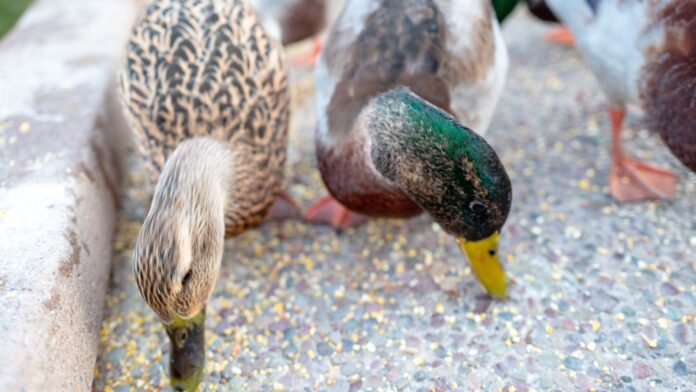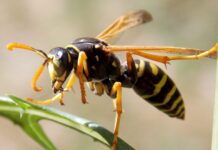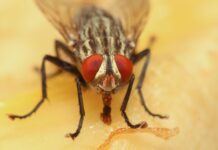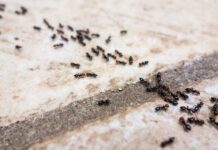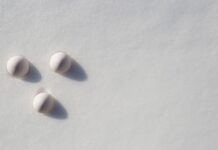Ducks need a balanced diet year-round, but during winter, they require more calories and specific nutrients to stay warm and maintain egg production. This guide explains what to feed your ducks during the winter months to keep them healthy and productive, including high-protein sources, energy-rich grains, and fresh vegetables.
Increase Caloric Intake to Stay Warm
During the winter, ducks burn more calories to stay warm, so they need extra energy from their food. This doesn’t just help with body warmth—it also supports overall health and egg production.
High-calorie food options:
- Scratch Grains: A mix of cracked corn, wheat, barley, and oats provides energy-rich carbohydrates that ducks need to generate body heat. Feeding ducks scratch grains in the evening can help them stay warmer through the night.
- Cracked Corn: This is a favorite winter food for ducks because it is high in calories and provides immediate energy. It should be given in moderation, balanced with protein-rich feed.
- Sunflower Seeds (with shells): High in fat and protein, sunflower seeds offer ducks the energy they need to cope with the cold. The added fat content is particularly helpful in keeping them warm.
Maintain Protein for Feather Health and Egg Production
Protein is essential for ducks, especially during the colder months when their feathers require maintenance to keep them well-insulated. If your ducks are still laying eggs in winter, protein is crucial for egg production as well.
Protein-rich food options:
- Layer Feed or All-Flock Pellets: If your ducks are laying eggs, continue to offer a high-quality layer feed. If not, an all-flock feed provides the right balance of nutrients for both laying and non-laying ducks. Look for a feed with at least 16% protein.
- Mealworms and Black Soldier Fly Larvae: These protein-packed treats mimic the insects ducks forage for in warmer months and are excellent for keeping ducks healthy during the winter. You can feed them dried or rehydrated.
- Fish Meal or Small Fish: If available, offer small amounts of fish meal or even small fish, which are rich in protein and omega-3 fatty acids. These can support both egg production and general health.
- Scrambled Eggs: As an occasional treat, scrambled eggs are a great way to provide ducks with extra protein. Just be sure they are plain and free of seasoning.
Provide Fresh Vegetables for Vitamins and Enrichment
Even though natural foraging is limited in winter, ducks still benefit from leafy greens and vegetables to meet their nutritional needs. These fresh foods are not only nutritious but also add variety to their diet, keeping them engaged and entertained.
Vegetable options:
- Leafy Greens: Ducks love fresh greens, so offering spinach, kale, lettuce, and other leafy vegetables can help provide essential vitamins like A, C, and K. These can be given fresh, wilted, or even lightly steamed.
- Cabbage and Broccoli: Hanging a head of cabbage or broccoli in their pen provides both a nutritious snack and enrichment, as ducks will peck at it throughout the day.
- Frozen Peas and Corn: Thawed frozen peas and corn are nutritious treats that ducks enjoy. They are rich in vitamins and carbohydrates, making them great for winter feeding.
- Carrots (Grated or Cooked): Rich in beta-carotene, carrots provide a boost of vitamin A. You can offer them grated or lightly cooked to make them easier for ducks to eat.
Balance Calcium for Egg Production
If your ducks are still laying eggs in winter, they need plenty of calcium to maintain shell strength. A lack of calcium can lead to weak eggshells or even stop egg production altogether.
Calcium-rich food options:
- Oyster Shells: Keep a dish of crushed oyster shells available at all times. Ducks will eat what they need to supplement their calcium intake, especially laying hens.
- Calcium-Boosted Layer Feed: Layer feed already contains the necessary calcium for egg-laying ducks, so make sure it’s the base of their diet if your ducks are still producing eggs.
- Eggshells: You can offer crushed, clean eggshells as a calcium supplement. Just be sure to crush them finely to prevent ducks from recognizing them as eggs, which could lead to egg-eating behavior.
Ensure Access to Grit for Digestion
Since ducks won’t be foraging for stones and grit in the winter, it’s important to provide them with grit to help digest their food properly. Grit helps break down grains and vegetables in the duck’s gizzard, aiding in digestion.
Grit options:
- Commercial Poultry Grit: Provide a container of poultry grit, available at feed stores, to ensure ducks have access to this essential digestive aid.
- Natural Grit in the Run: If possible, you can scatter small pebbles or coarse sand in their outdoor area so they can pick up grit naturally as they forage.
Keep Food and Water Accessible and Unfrozen
Ducks need access to fresh food and water throughout the day, but freezing temperatures can make water management a challenge. Ducks also tend to eat more in cold weather, so keeping food available at all times helps them maintain their energy levels.
Food and water tips:
- Heated Waterers: To prevent water from freezing, use heated water bowls or buckets. Ducks need to submerge their bills in water to eat properly, so make sure water is always available.
- Lukewarm Water: If you don’t have heated waterers, change the water frequently to keep it from freezing. Offering lukewarm water can also encourage ducks to drink more during cold days.
- Offer Food Twice a Day: In particularly cold weather, feed your ducks twice daily—once in the morning and again in the evening—to ensure they are getting enough calories. Be sure to remove uneaten food that might freeze or spoil.
Encourage Natural Foraging and Enrichment
Even though winter limits natural foraging, you can still encourage your ducks to engage in natural behaviors, which are important for their mental and physical health. By scattering food or providing enrichment toys, you can keep them active and satisfied.
Foraging and enrichment tips:
- Scatter Grains and Seeds: Scatter scratch grains or seeds in their outdoor area to encourage natural foraging behavior. This keeps them active and prevents boredom.
- Water Pans for Dabbling: Even in cold weather, ducks love to dabble in water. Place shallow pans of water in their outdoor area and toss in thawed peas or floating treats to keep them entertained.
- Hang Treats: Hanging leafy greens or cabbage in their enclosure can provide both nutrition and enrichment, allowing ducks to peck and forage throughout the day.
Monitor Egg Production and Health
Winter can cause a natural slowdown in egg production, especially as daylight hours decrease. However, with proper nutrition and care, many ducks will continue laying through the winter.
Tips to support winter egg production:
- Extend Daylight Hours: Ducks need around 14-16 hours of light to lay eggs consistently. Using a low-wattage light on a timer in their coop can help extend “daylight” hours, encouraging continued egg production.
- Check for Frozen Eggs: Eggs can freeze quickly in winter temperatures. Collect eggs frequently to prevent freezing, which can damage the eggshells and affect their quality.
By providing a well-balanced diet rich in protein, calories, and fresh vegetables, along with managing water and grit needs, you’ll keep your ducks healthy and productive during the winter months.


